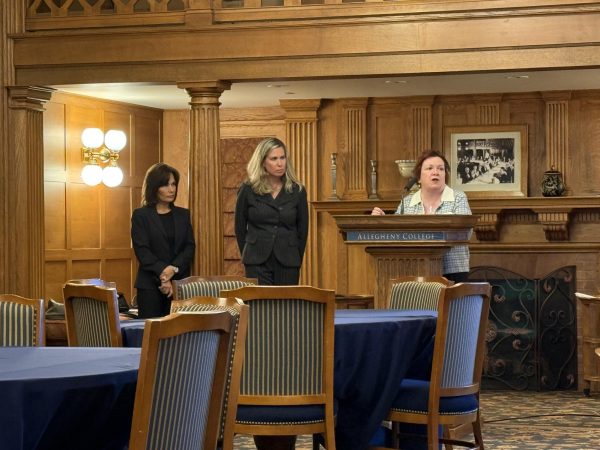Campus crime reports updated and expanded
In its 2016 Annual Security and Fire Report, the Office of Public Safety, added two sections not previously included in the 2015 Clery Report.
The department added a more detailed section specifically stating where fires occurred in residential facilities, as well as a monthly breakdown of crimes reported to public safety during the 2015 calendar year.
Vice President of Student Affairs and Dean of Students Kimberly Ferguson said the inclusion of this information is part of an attempt by the college to make the annual report more detailed.
“It’s much more comprehensive—from what I understand—from previous years, because the document they provided last year was what, less than 30 pages?” Ferguson said.
Ali Awadi, director of public safety, said the report also included information about campus security policies.
“I didn’t want it just to be 12 pages,” Awadi said. “There’s policies that have to be in there, and some of those policies were taken from The Compass. … [Public safety’s] goes more in-depth and picks out those [policies] that really have to go in there.”
Public Safety Office Coordinator and Secretary Marilyn Moore said the monthly breakdown has always been available, just not on the department’s website.
“It’s always available,” Moore said. “You can go online, to the Pennsylvania State Police [website].”
Ferguson said the college has not provided the monthly breakdown to students in the past.
“It’s there, we just haven’t sent it to you all before,” Ferguson said.
According to Pennsylvania’s Uniform Crime Reporting Act, passed by the state assembly in 1991, each institution of higher education is required to provide an annual report to the Pennsylvania State Police regarding crimes on campus, as well as a public daily crime log.
According to the 2016 Handbook for Campus Safety and Security Reporting, available on the U.S. Department of Education’s website, the The Jeanne Clery Disclosure of Campus Security Policy and Campus Crime Statistics Act also requires public safety to provide a daily crime log.
Awadi said the requirements for the Clery Act and the Uniform Crime Reporting Act are different. He said the Clery Act requires all incidents reported to public safety be included in the annual Clery Report, but the UCR only requires crimes directly reported to public safety or to the Meadville City Police Department. For example, sex crimes reported to Title IX, where the survivor did not report to public safety, are not required to be included in the UCR report, according to Awadi.
According to Awadi, offices including student conduct and Title IX typically report to public safety that a crime occurred on campus when safety officers did not fill out an incident report. However, he said, the information received from the offices does not include information the UCR requires.
“Title IX has to report it to us, just to let us know it occurred, without the details,” Awadi said.
The college’s annual report states that any crimes brought to the attention of a “campus security authority” can be considered “reported,” though it is not mandated to be included in any public report.
“A Clery Act crime is considered ‘reported’ when it is brought to the attention of a CSA, Public Safety, or local law enforcement personnel by a victim, witness, other third party or even the offender,” the report says.
The report says sworn law enforcement personnel and department administrators, persons responsible for public safety, and officials with significant responsibility for student and campus activities are typically defined as CSAs.
The Department of Education’s Handbook states that the dean of students, director of athletics, a student resident assistant and the Title IX coordinator are typically considered CSAs. The handbook says that while a crime is “reported” when brought to the attention of a CSA, the college can determine if it warrants being included in its annual report.
“Public safety, Dean of Students Office, and the Title IX Office reviews Report Forms and makes a determination if an incident warrants issuance of a crime alert/emergency notification to the college community and whether it is a qualifying (reportable) Clery Act crime to be included in the Allegheny College Annual Security and Fire Report,” the handbook says.
Awadi said the department has made the daily crime log more succinct. He said it used to include up to a year’s worth of crimes, but now it includes 60 days, which is still compliant with the Clery Act.
“It can confuse people, and it’ll show a lot [of crimes],” Awadi said. “Someone might not read the date.”
According to Awadi, the college can also issue a “timely warning” if the department feels there is an ongoing threat to the college due to a crime.
“If we feel that there’s a danger to our college community, or even to the outlying community, we would put out what’s called a timely warning,” Awadi said.
Public safety’s annual report includes a definition of the college’s timely warning policy.
“Timely warnings include information about the crime that triggered the warning, but do not include personally identifiable information about the victim of the crime,” the report says. “The content and amount of information varies depending on the nature of the threat, the amount of information available to first responders, the risk of compromising law enforcement efforts, and other factors.”
The Department of Education’s Handbook provides an example of when to issue a timely warning.
“For example, if a Rape is reported on campus and the alleged perpetrator has not been caught, there is a risk of similar crimes,” the handbook says. “If the alleged perpetrator was reported or apprehended, there may not be a continuing risk.”
Awadi said public safety is considering other measures to make compliance with the Clery Act and Pennsylvania’s UCR easier. He said the college will soon implement a program, “Report Exec,” which will compile data for the annual Clery Report from previous reports, rather than compiling the data manually.
“We want to make sure, moving forward—because I don’t want to look back, I look forward—that everything is done according to the state and, really, to benefit the student,” Awadi said.





